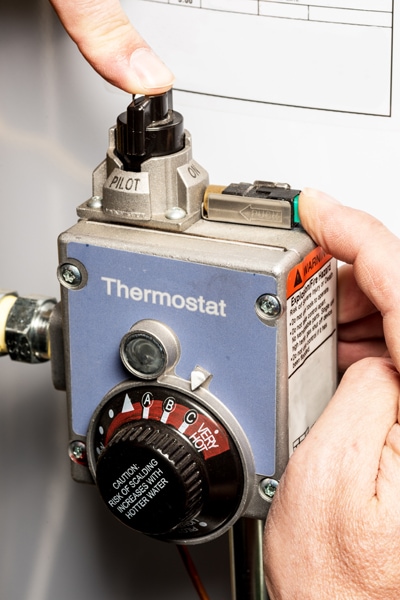The pilot light on a water heater is typically always on. It stays lit to ignite the gas as needed for heating water.
A water heater’s pilot light plays a crucial role in its operation. This small flame ensures that your water heater efficiently heats water on demand. Understanding how the pilot light functions helps maintain your unit and prevents issues. If the pilot light goes out, your water heater will not operate correctly.
Regular checks can prevent inconvenient surprises, especially during cold months. Knowing whether your pilot light is on can save energy and keep your home comfortable. Familiarizing yourself with this simple aspect of your water heater enhances your overall maintenance routine. Stay proactive to ensure your hot water supply remains uninterrupted.
Page Contents
- 1 Introduction To Pilot Lights
- 2 Common Myths About Pilot Lights
- 3 The Truth About Water Heater Pilot Lights
- 4 Safety Concerns And Pilot Lights
- 5 Maintenance Tips For Pilot Lights
- 6 Impact On Energy Bills
- 7 Modern Water Heaters And Pilot Lights
- 8 Faqs About Water Heater Pilot Lights
- 9 Frequently Asked Questions
- 10 Conclusion
Introduction To Pilot Lights
The pilot light is a small flame in a water heater. It helps ignite the gas burner. A pilot light is usually always on in traditional models. It provides a constant source of ignition.
In some newer models, the pilot light may turn off automatically. This feature improves energy efficiency. The pilot light’s main role is to ensure safe operation. A malfunctioning pilot light can lead to heating issues.
Understanding how pilot lights work is important. They use a thermocouple to detect heat. If the flame goes out, the thermocouple shuts off the gas. This prevents gas leaks and keeps homes safe.
Common Myths About Pilot Lights
The pilot light on a water heater is not always on. Many believe it needs to stay lit all the time. This is a common myth. In reality, some modern water heaters have electronic ignition systems. These systems ignite only when hot water is needed.
Energy consumption misconceptions also arise. A constantly lit pilot light can waste gas. Turning it off when not in use saves energy. This can reduce monthly utility bills. Knowing how your water heater operates is important for saving money.
The Truth About Water Heater Pilot Lights
The pilot light is a small flame in a water heater. It helps ignite the gas when needed. Some water heaters have a continuous pilot light. This means the flame stays on all the time. This type uses gas even when not heating water.
On the other hand, on-demand systems only ignite the flame when necessary. These systems save energy by using gas only when heating is required. They are more efficient and can lower utility bills.
Choosing between continuous and on-demand systems depends on your needs. Consider factors like energy costs and usage patterns.

Credit: dengarden.com
Safety Concerns And Pilot Lights
The pilot light on a water heater is crucial for its operation. A constant flame ensures hot water is available. However, it can also pose safety risks. If the pilot light goes out, gas can accumulate, leading to potential explosions or fires.
To minimize these risks, regular maintenance is essential. Check the pilot light frequently to ensure it stays lit. Install a carbon monoxide detector near the water heater. This device will alert you to dangerous gas levels.
Always follow the manufacturer’s guidelines for your specific model. If you smell gas, turn off the supply and ventilate the area. Call a professional for help immediately.
Maintenance Tips For Pilot Lights
Check the pilot light on your water heater regularly. This helps prevent problems. A bright blue flame means the pilot is working well. If the flame is yellow or orange, it may need attention.
Look for dust or dirt around the pilot area. Cleaning it can help keep the flame steady. If the pilot light goes out, follow the manufacturer’s instructions to relight it.
Common issues include a draft or a faulty thermocouple. A draft can blow out the flame easily. The thermocouple is a safety device. If it’s broken, the pilot light won’t stay lit.
Check the gas supply as well. Make sure the gas valve is open. If you notice any strange smells, turn off the gas and call a professional.

Credit: www.comfortzoneweiser.com
Impact On Energy Bills
The pilot light on a water heater can affect your energy bills. Keeping the pilot light on uses gas continuously. This can lead to higher costs over time.
Understanding the costs helps homeowners make better decisions. If the water heater is not used often, turning off the pilot light may save money. Consider the savings versus the convenience of having hot water ready.
| Action | Cost Impact |
|---|---|
| Keep Pilot Light On | Higher monthly bills |
| Turn Off Pilot Light | Lower monthly bills |
Reducing expenses is important for many families. Simple changes can lead to significant savings over time. Always check the water heater’s manual for the best practices.
Modern Water Heaters And Pilot Lights
Modern water heaters have changed how pilot lights work. Many now use electronic ignition systems. These systems only ignite when needed. This feature saves energy and improves safety.
Some options replace traditional pilot lights. Direct Spark Ignition is one such method. This system lights the burner directly. It reduces gas use and helps prevent accidents.
Hot Surface Ignition is another alternative. It uses a glowing element to ignite gas. This method is very reliable and efficient.
| Type | Description |
|---|---|
| Direct Spark Ignition | Lights burner directly, saves gas. |
| Hot Surface Ignition | Uses a glowing element, very reliable. |

Credit: www.acehiplumbing.com
Faqs About Water Heater Pilot Lights
The pilot light on a water heater is not always on. It can go out for various reasons. Relighting it is often simple and safe. First, locate the reset button and the thermocouple. Wait a few minutes before attempting to relight.
Follow these steps to relight:
- Turn off the gas supply.
- Wait for a few minutes.
- Use a long lighter to ignite the pilot light.
- Turn the gas supply back on.
If the pilot light does not stay lit, it may indicate a problem. Call a professional plumber for further assistance. Do not attempt repairs if you feel unsure.
Frequently Asked Questions
Is It Ok To Leave Pilot Light Off Water Heater?
Yes, it’s okay to turn off the pilot light on your water heater if you won’t need hot water for an extended period. This helps save energy and reduces gas bills. Just remember to relight it when you’re ready to use the water heater again.
Should The Pilot Light Always Be On?
Yes, the pilot light should generally remain on. It ensures your gas appliances ignite properly. If it goes out, relighting it is necessary. Always check for gas leaks or issues if the pilot light frequently extinguishes. Regular maintenance can prevent problems and ensure safety.
Why Won’t The Pilot Light On My Water Heater Stay Lit?
The pilot light may not stay lit due to a faulty thermocouple, a dirty pilot tube, or a gas supply issue. Check for drafts or improper ventilation as well. Regular maintenance can help prevent these issues and ensure consistent operation.
How Do I Know If Water Heater Pilot Is On?
Check the pilot light’s color. A steady blue flame indicates it’s on. If the flame is yellow or flickering, it may be off. Listen for a faint clicking sound when the heater operates. Inspect the glass window on the water heater for visibility of the flame.
Conclusion
The pilot light on a water heater is not always on. It can extinguish due to various reasons, such as drafts or malfunctions. Regular maintenance can help ensure it stays lit. Understanding this aspect can save energy and improve efficiency.
Keep your water heater in top shape for optimal performance.
